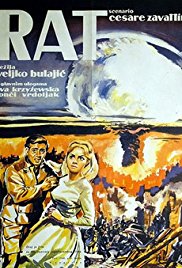IMDb 1 hour and 35 minutes, rated 6.1 by a paltry 179 ra(n)ters.
Jack and Jill are about to get married on a fine spring day somewhere in Europe. Jack buys flowers for Jill as he hurries to the get himself to the church on time. In the street a one-note newsboy shouts, repeatedly, ‘War declared!’ Jack only has ears for church bells and ignores this declaration, while others in the street react in alarm, amusement, and denial.

The release title was ‘Rat’ which is ‘War’ is Serbo-Croatian, the language in which the film was made in Zagreb of the Tito’s Legoland Yugoslavia.
Mistaking him for Kevin, everyone asks Jack what will happen. His parents must have been Pollyanna and Dr Pangloss because he is exhaustingly optimistic about everything. For him an empty coffee cup is an opportunity to do without coffee, and not a life threatening disaster. Figure that out! Everything is fine. Everything will work out for the best. All is good. All is ad nauseam. He is the kind who would grin through a 360 degree review, because he enjoyed it!
While Jack and Jill are at the altar the bombs start falling. He keeps smiling. As they leave the church with you-know-what-in-mind he is press-ganged into the army. Next thing you know he has changed costume and is parading around in a uniform with a firearm. More bombing occurs, but Jack is sure wiser heads will prevail. As if.
While in a bomb shelter he suggests people proclaim their desire for peace. They do. He is then a traitorous ringleader in a rebellion, apprehended, and sentenced to be shot. He keeps smiling, while inviting the firing squad and the sentencing officer around for dinner when all this is straightened out. Which it will be very soon!
But then it gets brighter than a thousand suns. Afterwards while crawling around in the rubble, Jack meets the Prime Minister who assures him that war was the will of the people per the ‘White Book,’ on which more later. The shock wave blew off most of Jill’s clothes and that briefly piqued the interest of the fraternity brothers. As the radiation washes around them, Jack and Jill retire to their new apartment – a ruin – and he sets about making coffee. She does a swan die. Will Jack wake up to reality now? Fade to black.
The end.
Well, it is an anti-war film of sorts, with special reference to atom bombs, coming out of the precariously non-aligned patchwork that was the workers paradise of Yugoslavia. Given the post-Tito blood bath of that part of the world, I wondered if a contemporary audience in Belgrade would have perceived the origins and ethnicity of each of the players. Is that why Jill is played by a Pole? To confound that ethnic typing and residual animosity there in paradise? Or to gain it box office in Warsaw?
There is a cast of thousands, and it looks like the army cooperated, given all the marching men, weapons on parade, and fly overs. In the time and the place that cooperation would make it an official government film in all but name. It was bought, edited, and dubbed for the US drive-in market as background to anatomy lessons.
The cast and crew were among the best in Belgrade but this is not their best work. Most of the failure goes to Cesare Zavattini, the script writer who settles for simple-minded nostrums and witless Chaplineque situations, though that may have been what the producers wanted. Hard to believe the same typewriter produced ‘Shoeshine’ (1946) and ‘The Bicycle Thief’ (1948).
The ‘White Book’ the grovelling prime minister carried, seemed to be a report on public opinion regularly prepared for him. Gallup was not involved. A short search on Dr Google produced no enlightenment on the subject. But the combination of ‘White Book’ and Yugoslavia produces many hits, false positives.
The comparison has got to be ‘La Jetėe’ (1962), reviewed elsewhere on this blog, which is far more imaginative, creative, enticing, and enigmatic. It gets across more in its running time of twenty minutes than this feature length film does in ninety minutes.
Skip to content
